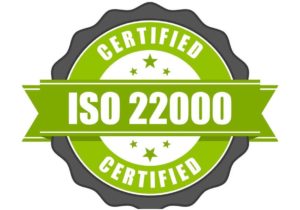ISO 22000 in Canada (Food Safety Management System – FSMS)

ISO 22000 (Food Safety Management System – FSMS) certification covers all the processes in the food chain that impact the safety of the end product. The standard specifies the requirements for a comprehensive food safety management system, as well as incorporating the elements of Good Manufacturing Practice (GMP) and Hazard Analysis Critical Control Points (HACCP).
ISO 22000 (Food Safety Management System – FSMS) creates a food safety standard that harmonizes the various national standards into one easy to understand set of requirements that are simple to apply and recognized around the world. This internationally recognized food safety standard can be used by all organizations in the food supply chain from farming to food services, processing, transportation, and storage through packaging to retail.
ISO 22000 combines and supplements the core elements of ISO 9001 (QMS) and HACCP to provide an effective framework for the development, implementation, monitoring, and continual improvement of a documented Food Safety Management System (FSMS) within the context of the organization’s overall business risks.
ISO 22000 certification is intended for organizations seeking to establish a more focused, coherent, and integrated FSMS than is normally required by law. The standard requires meeting any applicable food safety related statutory and regulatory criteria into its food safety system (FSMS).
The new version of the ISO 22000:2018 also introduces the Plan-Do-Check-Act (PDCA) cycle and risk-based thinking. By combining PDCA and risk-based thinking to manage business risk with HACCP to identify, prevent and control food safety hazards, ISO 22000 helps organizations to reduce risk exposure and improve safety.
Benefits of implementing ISO 22000
- Help you to Introduce internationally recognized processes to your business
- Help you to give suppliers and stakeholders confidence in your hazard controls and enable you to put these hazard controls in place across your supply chain
- Introduce transparency around accountability and responsibilities
- Ensure sustainable food safety
- Continually improve and update your systems so it stays effective
- ISO 22000 contains the food safety management system requirements of FSSC 22000, and is used along with requirements for prerequisite programs for the appropriate industry sector.
Nowadays, traceability has become a regulatory requirement to protect human health and consumers interests in relation to food. Besides many other guidance standards and technical specifications of ISO 22000 family, the International Organization for Standardization (ISO) published ISO 22005:2007, an international standard of traceability in the feed and food chain.
ISO 22005 standard of traceability in the feed and food chain requires organizations within the food chain to include the following aspects in the design of a traceability system:
- Identify the objectives of traceability system;
- Identify the relevant regulatory and policy requirements to be met by the traceability system;
- Identify the relevant products and/or ingredients for which the objectives of its traceability system apply;
- Determine the position of the organization within the food chain by identifying its suppliers and customers;
- Determine and document the material flow in a way it meets the objectives of the traceability system;
- Define the information requirements:
- to be obtained from its suppliers,
- to be collected concerning the product and process history, and
- to be provided to its customers and/or suppliers.
- Establish procedures to assist the management of traceability information, including:
- product definition;
- lot definition and identification;
- documentation of flow of materials, and information including media for record keeping;
- data management and recording protocols;
- information retrieval protocols.
- Determine documentation required to achieve the objectives of the traceability system.
It is important to be aware that the traceability system is simply a mean for attaining defined objectives in food safety. It is important not to hold high expectation, such as making traceability system itself as a food safety objective. ISO 22005 makes it very clear that this system is only a technical tool that assists organizations achieve defined objectives in the Food Safety Management System (FSMS).
The ability to trace the history, application and location of products up and down the supply chain is of high importance especially in the food chain. Establishment and application of a traceability system have become a mandatory requirement for food businesses, as it is a part of an overall food safety management system. Organizations involved in the food chain willing to comply with and get certified to the international standard for food safety management systems, ISO 22000, should have their product traceability system in place. ISO 22005 is another standard of ISO 22000 series which gives the principles and basic requirements for the design and implementation of a food traceability system.
Steps to Certification of your FSMS for ISO 22000
| Step1:
Complete a Quote Request for ISO 22000 by filling our questionnaire, so that we can understand your company and requirements. We will use this information to accurately define your scope of assessment and provide you with a proposal for certification of your FSMS. |
Step2:
Once you’ve approved your proposal for the certification of your FSMS, we will contact you to book your assessment with an SMG Assessor. This assessment consists of two mandatory visits that form the Initial Certification Audit. Please note that you must be able to demonstrate that your foods safety management system has been fully operational, has gone through the internal audit, and has been subject to a management review. |
Step 3:
Following a successful two stage audit, a certification decision is made and if positive, then certification to the required standard is issued by SMG. You will receive an electronic ISO 22000 certificate. Certification is valid for three years and is maintained through a program of annual surveillance audits and a recertification audit every three years. |